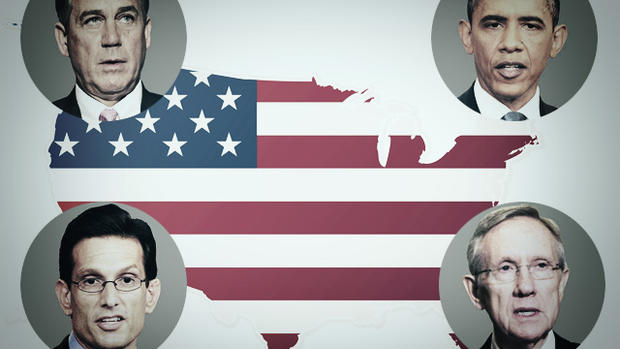Blame game over debt talks begins
This post originally appeared on Slate.
Kaboom! The effort to reach a grand bargain on raising the debt ceiling blew up Friday evening. Before the pieces had even hit the ground, both White House aides and congressional Republicans were pointing to them as evidence that they were right and the other side was wrong. In his press conference, President Obama said Republicans "wouldn't take yes for an answer." Republicans said the president pushed his luck, asking for tax increases which soured the deal at the last minute. Each side disputed the other's account.
This battle of the reconstruction will go on for months. At the same time, amid the he said/he said squabbling, we know reasonably well what each side was willing to do, and what each was unwilling to do. How you assign blame depends on how you see the world.
No new deal after White House meeting on debt limit
Why Obama wants to avoid a short-term deal on debt limit
CBSNews.com special report: America's debt battle
If you look to Washington for compromise in which each suffers some pain to get a mutually beneficial result, then you should credit the president for doing more than the Republicans. To anyone who has reported on this process over the last few months and in the fevered past few days, it was clear that Democrats were going to be taking the bigger hit to the things they cared about. Obama didn't even want spending reductions tied to the debt limit vote. The Tea Party changed the national political conversation. To catch up with the country's desire to cut spending, the president offered Republicans $3 trillion in cuts including offering to trim entitlements. His base, which includes people who think cuts of any kind are suicide, was furious at the size and kind of what Obama was offering.
If you hold this view about the way Washington should work, then you will find the president's words at the end of his press conference stirring. He was as angry as he has ever been in public as he talked about "ordinary folks who are struggling every day." He continued: "They know they're getting a raw deal, and they're mad at everybody about it. They're mad at Democrats and they're mad at Republicans, because they know somehow, no matter how hard they work, they don't seem to be able to keep up. And what they're looking for is somebody who's willing to look out for them. That's all they're looking for."
House Speaker John Boehner, meanwhile, says the White House was "refused to get serious about cutting spending." That's not true. The White House was willing to cut $3 trillion and take on programs that are as cherished by Democrats as tax cuts are by Republicans. That's serious, though it may not have been as serious as Boehner would have liked. Still, if you look to Washington for opposition to tax increases, and to hold steadfast to this position even when public opinion is running against you, then you should reward Boehner.
In this anti-tax worldview, the fact that Obama was willing to suffer a great deal more political pain is irrelevant, as are the niceties of compromise in divided government. The problem is the economy, and if you believe that tax increases of any kind will make the economy worse, then you are duty-bound to oppose them. It doesn't matter what the other side offers. Proof of how nervous Boehner was about losing support from the anti-tax caucus--which is to say, just about every Republican member of the House--came in several emails from his office arguing with the White House characterization of the deal as it was being negotiated. Boehner's office said that it was not true, for example, that he had considered letting the Bush tax cuts expire. To be seen as flirting with a tax increase is far worse than the benefit to be gained from being seen as flirting with compromise.
The polls show that the majority of voters, and particularly independent voters, wanted a "balanced approach," in the president's phrase. This should put Obama in a pretty good political position. But just because people have that opinion doesn't mean they will vote based on their opinion. Those conservatives who hate taxes and who cheer Boehner, in contrast, are more likely to vote based on their feelings.
It looked pretty depressing in Washington Friday night. Whichever way you see the world, Armageddon was still on the horizon with just 11 days to go. The president called congressional leaders into the White House for an 11 o'clock meeting Saturday morning to come up with a new agreement. Both sides said default was not an option. If this is really true then the anti-tax forces should feel encouraged. Their side is likely to win. With a fragile economy, the president can't risk not getting a deal. He would get the greater share of the blame if there was a failure. He'll either have to agree to a short-term deal, which he has said he would not agree to, or he'll agree to a lot of spending cuts with no tax increases, which will irritate if not infuriate his party.
Whatever the final deal, no one will be happy about it. Americans will have watched a process that will sour their mood even further. The accomplishment will simply be the bare minimum politicians could do. All of the points furiously being debated all week long and on Friday night will wither into a dull fight about what could have been.
More from Slate:
Why Do We Call the Gang of Six a "Gang"?
Jim DeMint, Bob Vander Plaats, Ovide Lamontagne: The three most important people in the Republican Party
The misleading statistic that makes politicians irrational about debt


